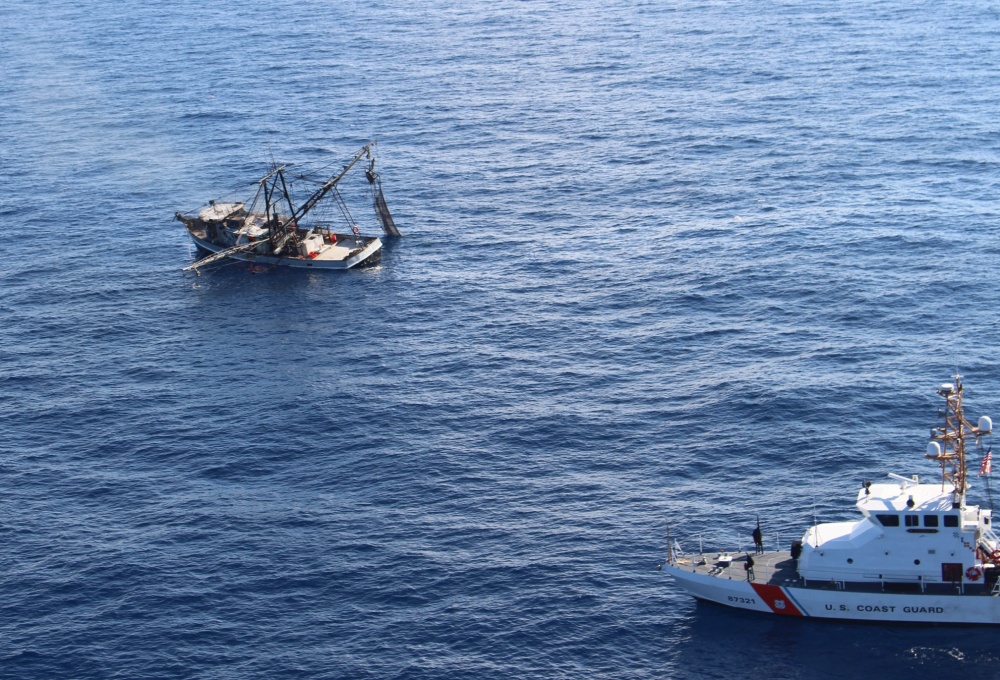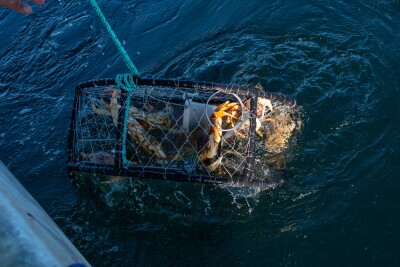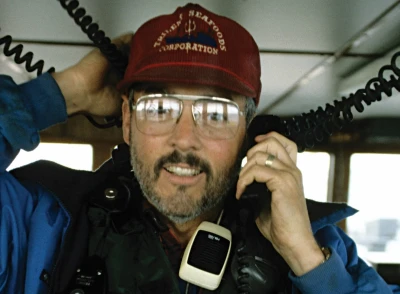Rescue and recovery tales from around the country and beyond. In this edition, medevacs in the Atlantic, a California fire and escape from a crabber.
Northeast

- The Coast Guard Cutter Dolphin crew towing the 90-foot Margaret Rose. USCG photo.
On April 1, the Coast Guard assisted the disabled 90-foot Margaret Rose after an engine failure 40 miles east of Atlantic City, N.J.
Watchstanders at Coast Guard Sector Delaware Bay were contacted around 10:30 p.m. and diverted the crew of the Coast Guard cutter Dolphin, out of Hampton Roads, Va., to assist.
The Dolphin crew towed the Margaret Rose with a crew of seven fishermen to Cape May, N.J., where the boat anchored and awaited commercial salvage.
“The captain of the fishing vessel notified the Coast Guard on his marine radio that they were in need of assistance,” said Chief Petty Officer Jacobe Hyre, the command duty officer. “We were able to get their exact location immediately and monitor their situation until help arrived because of their marine radio. It’s something we recommend every boat have because a routine trip on the water can change instantly.”
Coast Guard crews medevaced a 25-year-old man from the Point Judith, R.I.-based 45-foot Reaper after the fisherman had a seizure and hit his head after falling.
The captain contacted the Coast Guard around 11 p.m. on Monday, April 9, from 80 nautical miles southeast of Montauk, N.Y. A helicopter crew and fixed-wing Ocean Sentry plane were dispatched to the scene from Air Station Cape Cod.
The air crew arrived on the scene around 1:30 a.m, hoisted the fisherman and transported him to awaiting emergency medical staff at the T.F. Green Airport in Rhode Island for transfer to Providence Hospital.
On April 30, a Coast Guard aircrew medevaced a 36-year-old man suffering from a possible stroke aboard a fishing boat about 35 miles east of Manasquan Inlet, N.J.
The captain contacted Coast Guard Sector Delaware Bay at about 5:45 p.m. to request a medical evacuation.
A helicopter aircrew from Coast Guard Air Station Atlantic City and the cutter Sitkinak out of Sandy Hook launched to the boat's location. The aircrew hoisted the man aboard and brought him to Jersey Shore University Medical Center in Neptune, N.J.
“It was a challenging night hoist assisted by great coordination between Sector Delaware Bay and the cutter Sitkinak," said Lt. Spencer Grinnell, the co-pilot on the case.
Pacific
When the 54-foot Dungeness crabber Mt. Tamgas capsized 12 miles off Oregon’s Rockaway Beach on Easter Sunday, three of the four crew members made it safely into the life raft. Lucky for all of them, the Coast Guard’s response time was swift.
A Coast Guard air crew was on the scene of the capsize 34 minutes after the Columbia River sector received a mayday call from the captain at 4:17 p.m. A rescue swimmer helped to hoist all four crewmen to safety. All four returned to shore without further incident, though one member was admitted for hypothermia treatment.
The boat has been based out of Warrenton, Ore., since the start of crab season, and it was reportedly stacked out on the last string of the season.
Around 9 a.m. on April 18, a crew member aboard the 47-foot F/V Midori made a phone call no one ever wants to make: the Midori had caught fire.
The boat he called, the Charlie D, alerted the Coast Guard at Humboldt Bay, Calif., that the five fishermen aboard the Midori were preparing to abandon ship about 10 miles west of Trinidad.
A helicopter and a 47-foot motor lifeboat were launched to the scene. Luckily, the rescue was swift. The crew of the Midori had already donned their survival suits and abandoned ship into a life raft.
A good Samaritan fishing vessel, Pacific Bully, rescued all five crew members before the Coast Guard helicopter and boat arrived at the location to find the vessel’s pilothouse engulfed in flames.
Shortly after, the tugboat Michelle Sloan, diverted from its course and extinguished the fire aboard the Midori.
The captain of the Midori reported that the vessel had a maximum of 1,500 gallons of diesel remaining aboard, and that no serious injuries were sustained by the crew during the incident.
"The quick response of the vessels Pacific Bully, Charlie D and Michelle Sloan, along with the Midori’s readiness with appropriate survival equipment saved the lives of five fishermen yesterday," said Cmdr. Brendan Hilleary, the chief of response at Sector Humboldt Bay. "Our crews continued the good work this morning by mitigating the threat of pollution the vessel could have caused."
Before the vessel was towed to port, a helicopter crew from Sector Humboldt Bay conducted an additional overflight in the evening to assess any potential pollution and saw no signs of a spill in the area where the vessel caught fire.







